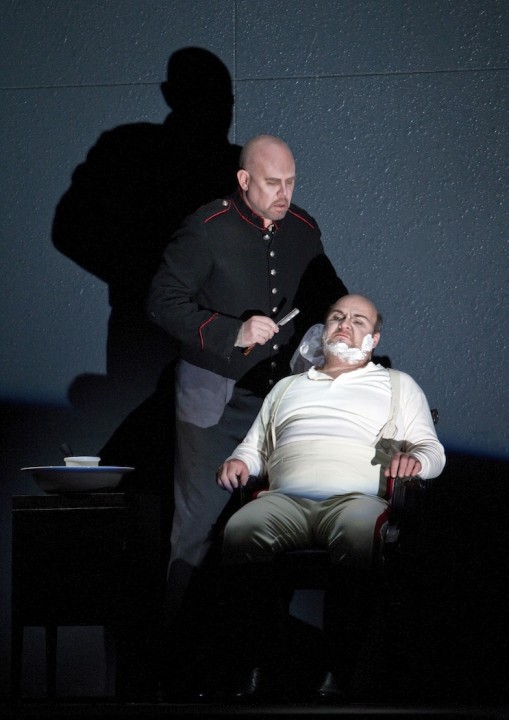Levine’s orchestral mastery proves most eloquent in Met’s “Wozzeck”

Alan Held in the title role and Gerhard Siegel as the Captain in the Metropolitan Opera production of "Wozzeck." Photo: Cory Weaver.
He gave up Das Rheingold and Il Trovatore but kept Wozzeck and Die Walküre.
That is how James Levine downsized his spring commitments at the Metropolitan Opera because of persistent back problems that have plagued him in recent months. One hesitates to look for any signs of favoritism here —he already conducted the new Rheingold last fall, whereas the Walküre staging has yet to be unveiled, which probably explains that choice.
But Levine has given ample demonstration of his devotion to both of Alban Berg’s operas during his forty-year Met career. The performance of Wozzeck on Saturday evening was his 36th with the company. And there must be more than a few Met regulars who have sampled the opera multiple times under his tutelage over the years, in the process coming to regard an opera that once seemed forbidding with genuine affection.
At any rate, there was considerable beauty in Saturday’s performance by Levine and the orchestra he has built. Some Wozzeck performances emphasize linear clarity and thus the opera’s modernistic side. Others stress the atonal opera’s very considerable common ground with the late Romantic German tradition. Levine’s performance did not go out of its way to do either, yet ended up keeping one mindful of each of the opera’s artistic faces.
There was ample tension generated from the pit to underscore the wrenching drama onstage of the downtrodden soldier apparently driven mad by his oppressive environment. But, perhaps because of the special circumstances of Levine’s performances, I found myself drawn primarily to his work with the orchestra and marveling anew at the musical riches of Berg’s score. Coordination was expert in a performance that gave eloquence to the music simply by letting every phrase—and there are some memorable melodies here—or other orchestral utterance unfold unaffectedly while profiting from Levine’s thoughtful attention to shape and balance. The orchestral interludes, climaxing with the surging passion of the one before the final scene, seemed as vital as the scenes themselves.
Not that there was anything particularly amiss with the onstage drama, even if the cast was not one of the most memorable the Met has ever assembled for Wozzeck. Alan Held, a veteran of the Met’s last revival, gave a powerfully sung performance and his hulking presence made Wozzeck’s degradation seem all the more pitiable. What is lacking is a lieder singer’s gracefulness of vocalism.
Marie is a stretch vocally for Waltraud Meier at this stage of her career—some of her high notes sounded like vibrato-less whistles—but this compelling artist brought a light touch to phrases others sing with more power, such as her opening, Soldaten, Soldaten! that was sometimes effective. Moreover, her commitment to the drama was thorough.
The character tenor Gerhard Siegel as the Captain, the cavernous-voiced bass Walter Fink as the Doctor, and the heldentenor Stuart Skelton all gave accomplished performances while leaving elements of these wonderful character roles unexplored. Wendy White did a fine turn as Marie’s friend Margret.
Mark Lamos’s 1997 production, revived this time by Gregory Keller, continues to serve the company reasonably well. It allows the drama to play out straightforwardly while refraining from offering any interpretive gloss on the characters or their plights. Robert Israel’s abstract sets often double as backdrops for the interplay of shadows (lighting by James F. Ingalls) and his costumes have the soldiers looking quite dapper in their dark blue uniforms, Wozzeck included.
There are two more performances of Wozzeck, on April 13 and April 16 (mat)
http://www.metoperafamily.org/metopera/season/production.aspx?id=11128